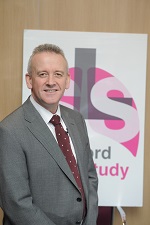 GlaxoSmithKline ($GSK) is doing something quite unprecedented. The pharma giant launched a study in the U.K. that would test its experimental drug called Breo/Relvar to investigate the potential blockbuster outside of a traditional clinical trial, in a way that simulates how patients with smoker's cough and asthma would take it in the real world. It's a big deal.
GlaxoSmithKline ($GSK) is doing something quite unprecedented. The pharma giant launched a study in the U.K. that would test its experimental drug called Breo/Relvar to investigate the potential blockbuster outside of a traditional clinical trial, in a way that simulates how patients with smoker's cough and asthma would take it in the real world. It's a big deal.
On March 7, FDA advisers meet up to weigh in on whether the drug, known generically as fluticasone furoate/vilanterol, should be cleared for the U.S. market to treat chronic obstructive pulmonary disease (COPD).
That GSK has a lot riding on the success of the drug--which would be marketed in the U.S. as Breo and in Europe as Relvar--would be shortchanging its importance. Glaxo has a deep pipeline of respiratory drugs, but this particular product could be its best shot at bolstering its No. 1 franchise after its marquee asthma drug Advair falls prey to generic competition in a few years.
Anyone wondering how Big Data could play a role in clinical development should be tuned in to this study. But why subject the closely watched prospect to the rigors of a large "real-world" study that isn't even required or part of its initial submissions for regulatory approvals? And what has the company learned from the first-of-a-kind study, which relies heavily on electronic records systems and analytics?
 |
| Dr. David Leather |
"Payers are giving a very clear message," Dr. David Leather, a member of the GSK team spearheading the study, told FierceBiotechIT.
What is lacking from double-blind randomized controlled clinical trials are data sets that show how well a patient who would not have qualified for such studies benefits from a drug. And payers have sought data on how treatments improve the health of patients--and not just those who fit the bill for a traditional clinical trial--Leather says. Payers want to know the "true value" of medicines before granting reimbursements, especially in Europe, where budgets are tight.
Enter GSK's Salford Lung Study, launched last year as the first real-world study of its size and scope involving an experimental drug. Unlike a traditional clinical trial, the study based in Salford, U.K., doesn't require regular visits to a study site to monitor the effects and safety of drugs. Rather, the study keeps tabs on patients via activity recorded in their electronic health records, hospital information and pharmacy data.
When the London-based drug giant and its partners such as North West e-Health embarked on the study, the team lacked all the IT tools and technology to gather data without scheduled check-ins.
"We've overcome the [technical] challenge, but there have been challenges," Leather says. "We've been developing software as we've gone along."
Fortunately, clinicians in Salford were already using integrated electronic health records for patients, with some experience in mining data from the systems. Yet data in those records are intended to meet the needs of doctors, not stand up to the quality standards of a clinical trial.
Glaxo and North West jointly developed improved data-extraction software and better analytics, Leather says. Then the group created a new electronic clinical report form for the 50 or so general practitioners in the study to gather required data. (Unfortunately, the pharmacies involved in the study weren't all using the same computer system, requiring them to fax prescription information to study managers to keep track of all the meds study patients are given.)
"We have an amazing amount of detail," Leather says. "This is really … about not just the primary endpoint but the observational data sets."
The study is comparing patients treated with once-daily Relvar with existing therapies, including GSK's Advair. Glaxo plans to enroll 4,000 patients with COPD and about 5,000 with asthma, with about half of them taking the now-experimental drug. Enrollment is ongoing, and the plan is to track patients for a year.
Glaxo says that there's more than 163 gigabytes of data already gathered for the study, and every night the company is processing about 500 megabytes of data. While those aren't huge numbers, the real-world data will show how often study patients refill prescriptions or end up in the hospital, as well as patterns of behavior before and after such events. The primary endpoints include how well the treatment impacts symptoms or exacerbations, but there's clearly more info being gathered to tell the story about what might have led to a particular outcome.
Safety is also hugely important. And the Salford study is expected to generate a wealth of data on adverse events associated with treatment. The study will include patients who are smokers and those with other conditions or health habits that could impact their lung ailments.
Once the results are in, Glaxo plans to use the data as supplementary information for Relvar. The information could help bolster the company's case for reimbursement with payers. More broadly, the company is drawing a blueprint for what is likely to become a more common practice as pharma outfits seek real-world data on drugs to show the value of meds earlier and earlier to win over payers. -- Ryan McBride (email | Twitter)